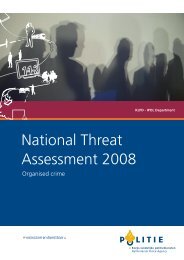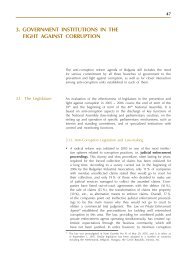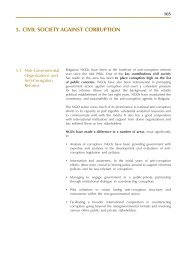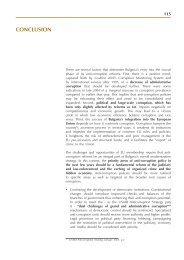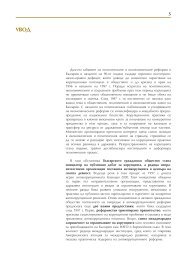Assessing the Effectiveness of Organized Crime Control Strategies ...
Assessing the Effectiveness of Organized Crime Control Strategies ...
Assessing the Effectiveness of Organized Crime Control Strategies ...
You also want an ePaper? Increase the reach of your titles
YUMPU automatically turns print PDFs into web optimized ePapers that Google loves.
<strong>Assessing</strong> <strong>the</strong> <strong>Effectiveness</strong> <strong>of</strong> <strong>Organized</strong> <strong>Crime</strong> <strong>Control</strong> <strong>Strategies</strong>:<br />
A Review <strong>of</strong> <strong>the</strong> Literature<br />
creating incentives for companies to do business with those who could provide this service at<br />
cut-rate prices. Criminal syndicates expanded <strong>the</strong>ir operations in <strong>the</strong> solid and hazardous waste<br />
hauling industries in response to <strong>the</strong> desire <strong>of</strong> corporations to externalize <strong>the</strong>ir responsibilities<br />
and minimize <strong>the</strong>ir costs in this area.<br />
Historically, <strong>the</strong>re has been a widespread reluctance, on <strong>the</strong> part <strong>of</strong> both regulators and <strong>the</strong><br />
regulated, to treat environmental crime as crime. Criminal sanctions are generally viewed as a<br />
last resort. Voluntary compliance and civil or administrative sanctions have been <strong>the</strong> standard<br />
means <strong>of</strong> environmental crime control (Carter, 1996/97:28). Weak controls, however, have led<br />
to degradation <strong>of</strong> <strong>the</strong> environment and one study notes that inadequate sanctions probably<br />
increase ra<strong>the</strong>r than decrease OC activities (Reuter, 1987).<br />
Carter’s (1996/97) analysis <strong>of</strong> <strong>the</strong> waste hauling and disposal industries provides some lessons in<br />
terms <strong>of</strong> regulation. A balance must be struck between inadequate regulation and its unnecessary<br />
proliferation, as <strong>the</strong> latter might hinder industrial activity. Carter asserts that regulations need to<br />
be comprehensive, so as to avoid loopholes that might be exploited by unscrupulous operators.<br />
The State <strong>of</strong> New York, for example, has permitted <strong>the</strong> disposal <strong>of</strong> construction materials on <strong>the</strong><br />
property owner’s land without requiring a permit. OC groups took advantage <strong>of</strong> this situation by<br />
burying toxic waste along with construction debris, unbeknownst to property owners.<br />
Carter adds that enforcers and regulators must be equipped with better tools to permanently<br />
revoke all permits, licenses, and o<strong>the</strong>r privileges to operate in an industry. Fur<strong>the</strong>rmore, he notes<br />
that penalties for deliberate violations <strong>of</strong> environmental laws should be increased and adequate<br />
resources must be available to enforcers.<br />
Regulatory reform in a number <strong>of</strong> areas illustrates <strong>the</strong> promise <strong>of</strong> this approach. When Rudolph<br />
Giuliani, formerly a US attorney known for his vigorous prosecution <strong>of</strong> OC, became mayor <strong>of</strong><br />
New York City, <strong>the</strong> city moved quickly to use its licensing power to remove corrupt unloading<br />
companies at <strong>the</strong> Fulton Fish Market (Jacobs and Gouldin, 1999:175). The Giuliani<br />
administration also used its regulatory authority and licensing powers to free <strong>the</strong> Feast <strong>of</strong> San<br />
Gennaro, one <strong>of</strong> New York’s most famous street fairs, from <strong>the</strong> grip <strong>of</strong> OC. The Cosa Nostradominated<br />
organization that for many years had run and pr<strong>of</strong>ited from <strong>the</strong> festival was replaced<br />
by an organization with no OC connections and by <strong>the</strong> Roman Catholic Archdiocese (Jacobs and<br />
Gouldin, 1999:175).<br />
Under Giuliani, <strong>the</strong> New York City Council also created <strong>the</strong> Trade Waste Commission TWC) in<br />
order to remove OC’s control over <strong>the</strong> waste hauling industry and to restore competition (Jacobs<br />
and Gouldin, 1999:175). The executive <strong>of</strong>ficers <strong>of</strong> this Commission included attorneys and<br />
police detectives with experience in OC investigations and prosecutions. The TWC was<br />
authorized to license carting companies and individuals with criminal records or known<br />
associations with OC or <strong>the</strong> mob-dominated cartel were denied licenses. The TWC also sought<br />
to streng<strong>the</strong>n <strong>the</strong> position <strong>of</strong> <strong>the</strong> customer by setting maximum rates, regulating contract<br />
duration, and by informing customers <strong>of</strong> <strong>the</strong>ir rights.<br />
52 | Research and Statistics Division / Department <strong>of</strong> Justice Canada



